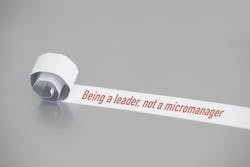This Annex is titled “Error Precursors.” The phrase itself gives you a good idea of what it means. Part 5 defines an error precursor as a situation in which the demands of the task and the environment in which it is performed exceed the capabilities of the individual(s) performing it or the limitations of human nature. Obviously, you want to eliminate these kinds of situations wherever possible. To do that, you need to identify such situations.
Q5 groups them into four broad categories:
- Task demands. The task requires mental, physical, or team effort that approach or exceed the limitations of the individual(s) involved. For example, the task is highly detailed and under normal conditions takes 35 to 45 minutes to perform, but (in this instance) it's inside a vessel at 110°F. Solution: Break into subtasks and/or ventilate/cool the inside of the vessel.
- Work environment. The company culture, organizational structure, and/or other workplace issues attenuate individual performance. For example, a micro-managing supervisor undermines a person's confidence. Solution: The worker should tell the supervisor how that style is making him feel and/or the supervisor's manager should assign a different supervisor for this project.
- Individual capabilities. An individual's mental, physical, and/or emotional characteristics don't match the demands of the specific task. For example, Bob, who is 6'4”, is tasked with entering a tiny vessel while Sarah is 5'2” and tasked with installing 4-inch rigid metallic conduit overhead. Solution: Have them switch assignments.
- Human nature. The traits, dispositions, and limitations common to everybody set people up for failure. Example: The same crew is assigned to pull 500 MCM cable for five 12-hour days in a row. Solution: To avoid the injuries that will result from fatigue (probably on the first day), divide the work among multiple crews and have them rotate assignments.
About the Author

Mark Lamendola
Mark is an expert in maintenance management, having racked up an impressive track record during his time working in the field. He also has extensive knowledge of, and practical expertise with, the National Electrical Code (NEC). Through his consulting business, he provides articles and training materials on electrical topics, specializing in making difficult subjects easy to understand and focusing on the practical aspects of electrical work.
Prior to starting his own business, Mark served as the Technical Editor on EC&M for six years, worked three years in nuclear maintenance, six years as a contract project engineer/project manager, three years as a systems engineer, and three years in plant maintenance management.
Mark earned an AAS degree from Rock Valley College, a BSEET from Columbia Pacific University, and an MBA from Lake Erie College. He’s also completed several related certifications over the years and even was formerly licensed as a Master Electrician. He is a Senior Member of the IEEE and past Chairman of the Kansas City Chapters of both the IEEE and the IEEE Computer Society. Mark also served as the program director for, a board member of, and webmaster of, the Midwest Chapter of the 7x24 Exchange. He has also held memberships with the following organizations: NETA, NFPA, International Association of Webmasters, and Institute of Certified Professional Managers.
